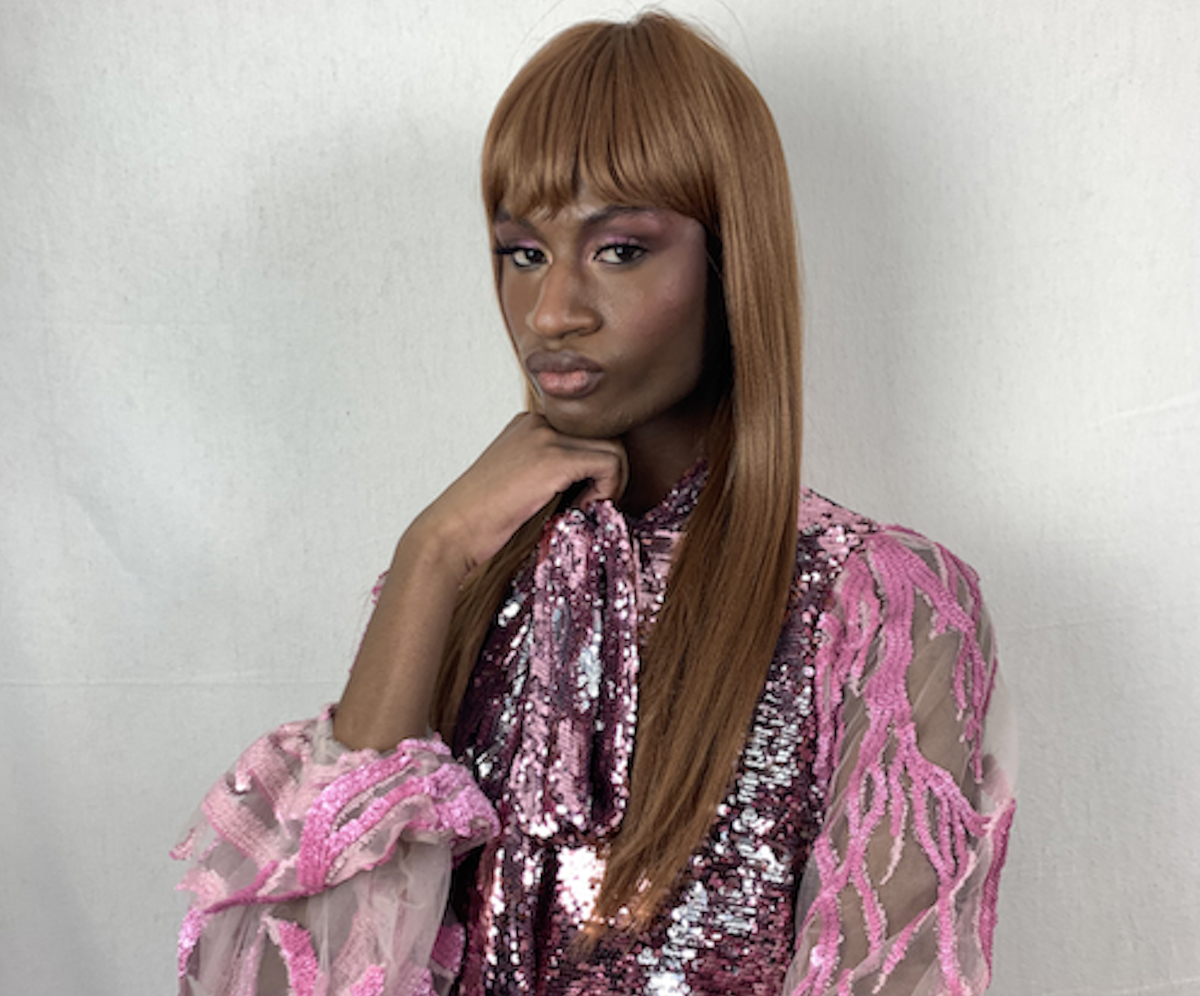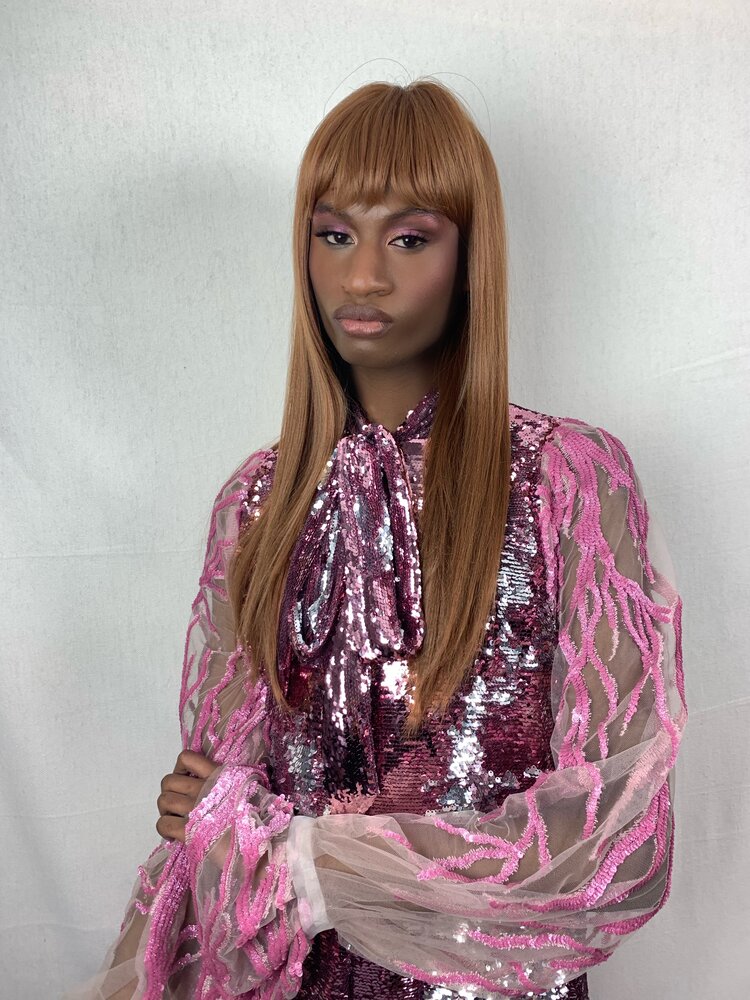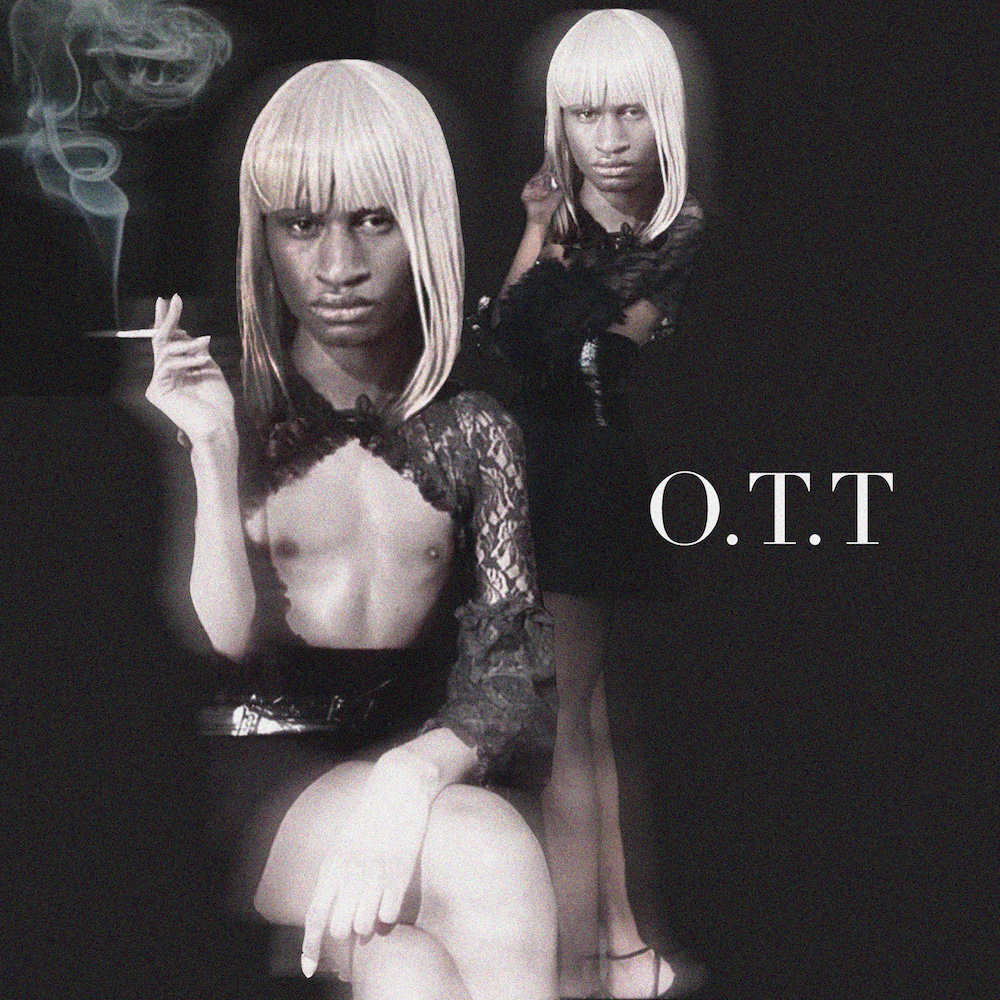Trey Gaskin: The London Muse & Podcast Extraordinaire You Need To Know
The rising model speaks exclusively to V about hosting one of fashion’s most hilarious, yet liberating podcasts.

Get ready, fashion world. Because Trey Gaskin is coming in hot! After dominating the London runways for the likes of Wales Bonner and Charles Jeffrey to most recently being a muse for designers Harris Reed and Mowalola Ogunlesi, the model and Central Saint Martins alum is certainly one to watch—and listen to. Gaskin has launched their own podcast titled “O.T.T.” where the muse plays host—inviting some of fashion’s brightest visionaries and longtime industry icons to speak on all things fashion, culture, and truly, whatever they want. V’s Kevin Ponce caught up with the larger-than-life personality to speak on the origins of the podcast, their dream guests, and how the truth can set you free.
Kevin Ponce: Let’s chat about OTT—you described this as: “The brainchild of model and journalist, Trey Gaskin. Covering everything from fashion to pop culture and highlighting the industry’s most promising and exciting young voices.” So tell us: what does OTT stand for?
Trey Gaskin: First of all, girl, you already know, let’s not even go there. It’s OVER THE TOP! It’s all about being over the top for me. Growing up, everyone always said that I was extra and it was kind of a negative thing. So at this point, [I wanted] to reclaim myself, reclaim my time, and reclaim my narrative. I deserve to be loud and this [podcast] was always coming in some format. This launch [happened] because it was my final project at Central Saint Martins before the plague happened.
KP: THE PLAGUE!
TG: Before the plague happened, I was working on a talk show and I had everything ready, and right when I’m supposed to do this: Corona—mother—fucking—virus. And I was just so distraught. I finally felt good about myself and felt secure and then this happens. I was tested and I tried, I cried, I drank, I smoked. I cried (again). Then somehow the podcast happened and it was easy to do from my room. I believe in divine timing and I also hate it at the same time but it worked out.
KP: You have how many episodes now?
TG: Four for now and we’re relaunching this week with Edwin Mohney, who is someone I think is so sick and so talented, and his work really speaks to the culture that we’re living in. For me right now, there is so much that I don’t like in the world and I just want it to be fun. You know, I don’t enjoy being a bitter bird all the time. I just want this to be something that gives you a light and joy, but also insight.
You know, it’s not about being an authority and that’s [something] I’ve never wanted to do. I’m not the Queen of Sheba. Like I just wanted something that [people can] gain insight from and also laugh and cry from. Like, I’m a Cancer, so I cry at everything. I just want everyone to feel welcome and accepted and for this to be your release.
KP: Absolutely! How do you go about selecting subjects to interview?
TG: Here’s my thing. It’s a mix of who I love that’s an emerging talent and then I have a list of legends that I will reach out to and when they want to do it, I lose my mind.

KP: Who’s on the legend list?
TG: The legends I want are Stacey Mackenzie, Bob Mackie, Miss Tina Turner, people who have LIVED, and continue to have legendary lives. I want the great older voices because we’re all going through things and it would be nice to have that insight from someone who’s lived. You know, when I did the Pat Cleveland episode, it meant so much to me because one she’s one of the greatest models of all time. But think about the time that we’re living in. We’re living in like a resurgence of the civil rights movement and she launched her career post-civil rights. Think Ebony fashion. Think about racism and discrimination, and yet she was still able to be a muse to every prominent person in fashion in the 20th century. It gives hope to us all. I love hearing the stories that you don’t always hear.
It’s very important to me to hear from people who really live their truth. I don’t want to hear some bullshit. We know how everyone loves to state the same story. It’s the same watered-down PR conversation. I think our generation will always crave authenticity. I want everyone to be able to talk their shit and be free within themselves and not feel restrained. This is not some Wendy Williams shit where I’m trying to set you up, like, I want everyone to be free. We just have a platform for everyone to speak their truth because especially in fashion media, everyone already has an idea of what they want someone else’s narrative to be and I really hate that because that’s not my business. Like your truth is your truth. I don’t want the spinning of someone else’s voice.
I want everyone to feel like what they say isn’t going to be someone else’s narrative—it’s their own. And it’s not like I have advertisers, so don’t sue me. Don’t do that! I just want everyone to think about themselves. What’s nice about the podcast is that it’s free-range and very conversational.
KP: Exactly! People think that just because we’re in quarantine and we’re in this mess where we need to be confined, it doesn’t necessarily mean that your soul or creativity needs to be. This is the time to look within and be like, Oh, this is what I’m about and this is what I’m only going to be about. The way that the fashion industry is shifting, we have to just be about ourselves and always live our truth, know our worth and come up off of it. You got your start with fashion through modeling, is that correct?
TG: When I was 18, I moved to London to study fashion journalism at Central Saint Martins. I was never in a position where I was ever asked to model. I never saw myself as one. So when was first asked, I was very taken aback. I’ve been very blessed to have incredible opportunities and incredible working relationships and everything always happens for a reason. But trust me, it’s been hard and I really learned my worth and to fight for myself. [In this industry], I’ve learned that people can be fetishized. They see that you’re black, you’re queer. Okay. Make like a fool. So the relationships that I do have now are what I’ve allowed because I only want to work with groups that see me for me and not a version of what they want. I know how to say no.
KP: The bravery of saying no is something that is tapped into a bit more now because of that notion of knowing your worth now. It’s all about showing the duality of your persona and your talents. If they’re never going to be appreciated or spotlighted, then why would you work a platform that will suppress it or misinterpret what you’re about.
You know, I met you when we were interns, at a publication that will not be named, and you were balancing the modeling and journalism and I was always admiring how you were managing your image in this industry, but also maintaining your sense of truth in the pieces that you were releasing digitally. Was venturing into another realm of broadcasting your message, in the form of podcasts this time, something difficult or rather easy to do, being that you’re so vocal about everything?
TG: No! You know, the one thing about me is if I don’t like something, you can see on my face—I do not have a poker face. I feel like this all the time with my work as well. It’s a double-edged sword because if I don’t want to do something. I will not do it. When I was an intern, the one thing I will say is I learned how to write about things that I don’t care about. I’ve bitten the tip of my tongue off to the point where I have no tongue left. When it came to the podcast, I have to have respect for you as a person and for your work for it to happen. We live in a culture that is very toxic. So for me, I wanted something that was truthful because you can tell the truth and not be horrible or mean. There are all sorts of horrible things going on in the world and I don’t want to focus on things I don’t care about. So what I will focus on are people that I care about and say who do I love and what have they not been able to say, because of the restrictions that are placed on them. With the podcast, it wasn’t hard because I felt like I finally had an unadulterated and unfiltered platform where I could be myself fully and not a different version of myself. So you know what, shout out to me and let me have a drink!
KP: Cheers to you, honestly, for owning a platform where you can be yourself completely and live unsilenced!
TG: You know what, let’s talk about this, right? Realistically, we live in a world where Black culture is a commodity. Blackness is a currency and Black people don’t own their shit. I’m well aware that Black voices are being used for free and for me, I just want to own something. My voice is not Blockbuster—you can’t rent it. It’s very FUBU: For Us, By Us. It’s always going to be a journey for us. I know all my Black creative friends are getting bombarded with requests, asking for interviews and quotes, you know, it’s reliving Black trauma for free. And it’s not even free because they are paying to deal with emotional trauma. So that’s why I just want to own something and do this for myself, by myself. At the end of the day, I’m not Ariel, bitch. My voice is mine and I’m not giving it up.
KP: 100%! It’s what you’re saying—borrowed voices and yet you’re reliving trauma for someone else’s platform.
TG: And we’re doing it for free! Let’s say this—if publications were actually diverse, you wouldn’t have to reach out to Black people all the time for an opinion, because you’d have a Black staff writer who could write about it. You don’t even have the infrastructure to make these points and yet you bring other people in for free. How are you saying #BlackLivesMatter when you don’t care about Black livelihoods?
KP: In a few years, where do you see OTT going?
TG: I’m only 22 and I think I need to really work on myself, celebrate life, and celebrate people who are here! Whatever optimism I can bring, I’ll do it. Just trying to let go and let god. Through all of the trauma and all the self-loathing, we gained [alot] by being ourselves, which is amazing. As we’ve learned so much, we’ve [also learned] to heal ourselves and move onwards and upwards. I just want to get to that period of [building] such a strong foundation of loving ourselves and enjoying the people that we are.
KP: Enjoying the people that we are. That’s the lifelong mission.

Check out the latest episode of O.T.T. on Spotify!
Discover More
